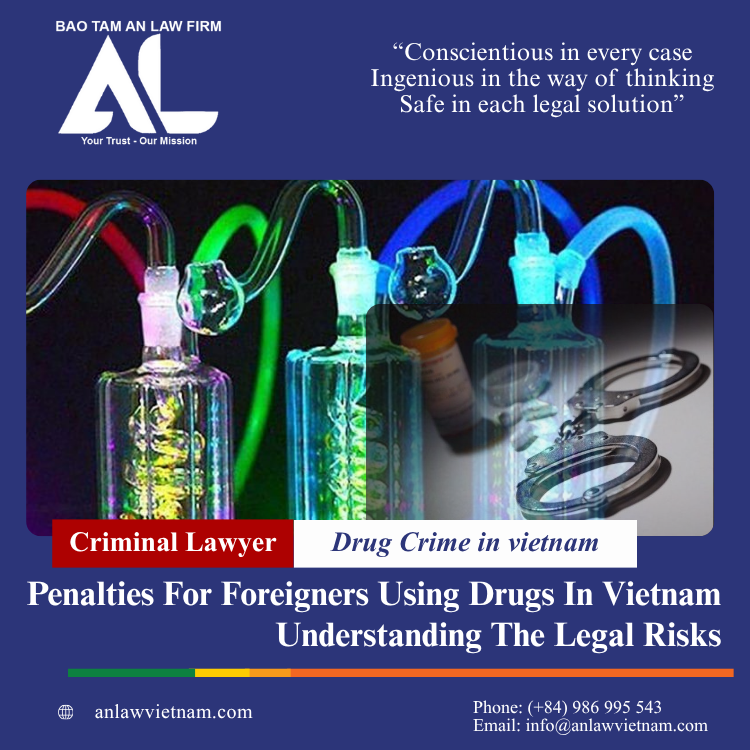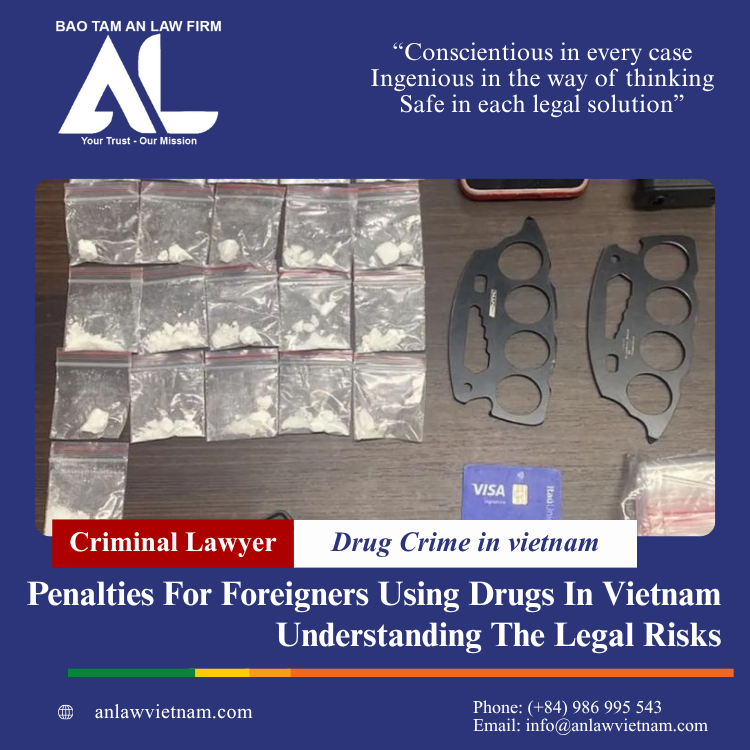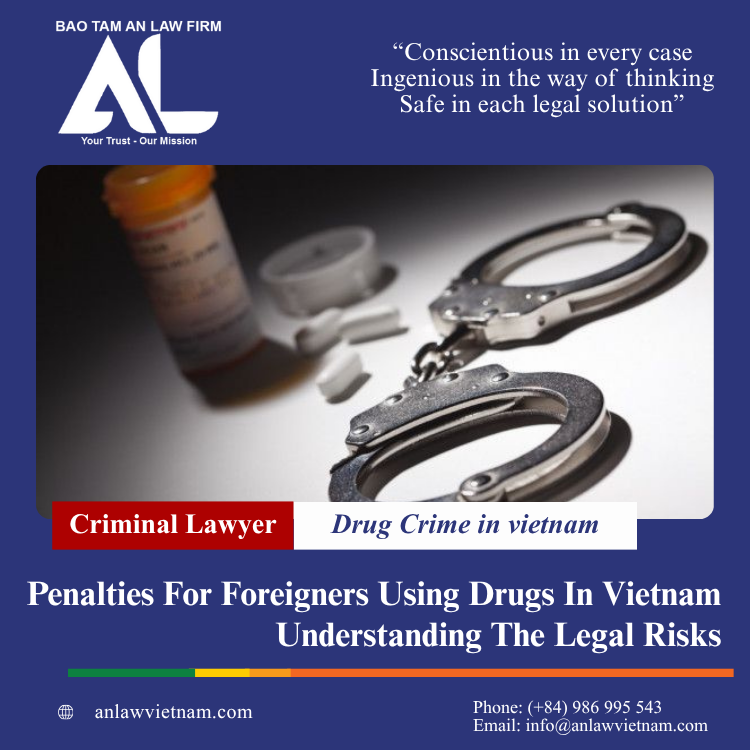Foreigner Arrested for Drugs in Vietnam | What Happens Next?
How are Foreigners Using Drugs in Vietnam Penalized? Can They Be Deported?
Vietnam maintains one of the most stringent criminal justice systems in Asia, particularly in relation to drug-related offenses (Drug Crime in Vietnam).
Foreign nationals who use, possess, transport, or trade drugs within Vietnamese territory may face administrative sanctions, criminal prosecution, and deportation.
If you are a foreigner living, working, or traveling in Vietnam, it is crucial to understand Criminal Law in Vietnam, especially the legal framework surrounding drug offenses and related criminal activities, to avoid serious legal consequences.
In this article, An Law Vietnam — a law firm specializing in criminal defense and drug-related cases for foreigners (Drug Lawyer for Foreigners) — provides a comprehensive overview of the applicable legal provisions, potential penalties, and your lawful rights under Vietnamese law.

What is Methamphetamine and Why is it Strictly Prohibited in Vietnam?
Methamphetamine, commonly known as crystal meth, is a highly addictive stimulant that severely affects the nervous system, mental health, and behavior.
According to the Law on Drug Prevention and Control 2021 and Decree No. 57/2022/NĐ-CP, Methamphetamine is classified as a prohibited narcotic substance under Vietnamese law.
Any act of using, possessing, manufacturing, or transporting this substance constitutes a serious violation of the law.
Vietnam enforces a zero-tolerance policy toward all drug-related activities, regardless of whether the offender is a Vietnamese citizen or a foreign national.
Can Foreigners Be Deported for Drug Use in Vietnam?
The answer is Yes.
Pursuant to Decree No. 144/2021/NĐ-CP, foreigners who illegally use narcotic substances in Vietnam may:
➤Be fined between VND 1,000,000 and VND 2,000,000, and
➤Be deported from Vietnam as an additional administrative penalty.
Deportation is considered one of the most severe administrative measures imposed on foreigners who violate public order, national security, or Vietnamese law.
Once deported, the individual is prohibited from re-entering Vietnam for at least three (03) years.
When Can a Foreigner Be Criminally Prosecuted?
Under Chapter XX of the 2015 Penal Code (as amended in 2017), the act of illegally using narcotics does not, by itself, constitute a criminal offense.
However, if the foreigner is found to have engaged in other criminal behaviors, such as:
➤Buying, selling, storing, transporting, or organizing the use of drugs, or
➤Providing venues or means for others to use narcotics,
they may face criminal prosecution, with potential sentences including lengthy imprisonment, life imprisonment, or even the death penalty, depending on the nature and severity of the offense.
Legal Treatment of Foreign Offenders under Vietnamese Criminal Law
According to Article 5 of the Penal Code of Vietnam, any criminal act committed within the territory of Vietnam — whether by a Vietnamese citizen or a foreign national — is subject to Vietnamese criminal law, unless the offender enjoys diplomatic or consular immunity.
This means that:
Nationality does not exempt anyone from prosecution under Criminal Law in Vietnam.
A foreigner who violates drug laws may be criminally prosecuted, imprisoned, and subsequently deported after serving their sentence.

Practical Examples
➤ Administrative Case: A Russian tourist was discovered cultivating seven (7) cannabis plants at a private residence. He was fined VND 3.5 million and subsequently deported from Vietnam.
➤ Criminal Case: The People’s Court of Quang Tri Province sentenced five (5) Lao nationals to life imprisonment and death for trafficking nearly 100 kilograms of narcotics.
➤ Another case involved a South Korean citizen who organized a drug-use party in Ho Chi Minh City and was deported after serving his prison term.
Similarly, An Law has had articles analyzing drug use cases in Vietnam and penalties “Read the article here”
These cases reflect Vietnam’s firm and uncompromising stance on Drug Crimes, irrespective of nationality or social status.
Legal Advice from An Law Vietnam – Drug Lawyer for Foreigners
For foreigners, even a minor misunderstanding in a social or party setting can lead to serious criminal implications. Therefore:
➤ Do not use or possess any form of narcotic substance in Vietnam.
➤ Do not accept or hold parcels or packages from others that you cannot verify.
➤ If you are questioned, detained, or accused of a drug-related offense, request immediate access to a lawyer.
An Law Vietnam is a law firm specializing in Criminal Law in Vietnam, with extensive experience assisting foreign clients involved in drug and criminal proceedings.
Our firm not only provides professional legal defense, but also supports communication with families and consular authorities, ensuring that our clients’ rights and wellbeing are fully protected throughout the process of investigation, prosecution, and trial.
Our bilingual (English–Vietnamese) legal team will:
➤ Clarify your legal rights and obligations under Vietnamese Criminal Law.
➤ Represent you before the investigating authorities and courts.
➤ Protect your lawful interests, minimize criminal liability, and assist with deportation or appeal procedures when applicable.

Conclusion
Vietnam’s drug control laws are strict, equitable, and uniformly applied to both citizens and foreigners.
Foreign nationals involved in Drug Crime in Vietnam may face administrative penalties, criminal prosecution, and deportation.
If you or your loved ones require assistance with Drug Crime in Vietnam or are seeking a Drug Lawyer for Foreigners, contact An Law Vietnam immediately for timely, confidential, and professional legal support.
Contact Us An Law Vietnam | International Law Firm in Vietnam
📞 Phone: (+84) 986 995 543
📧 Email: info@anlawvietnam.com
📍 Head Office: Diamond Plaza, 34 Le Duan Street, Sai Gon Ward, Ho Chi Minh City
🏢 Vung Tau Branch: Vo Thi Sau Street, Vung Tau Ward, Ho Chi Minh City
Note: The above information is for reference only. Depending on the time and specific circumstances, the content may no longer be applicable due to changes in legal policies. For any questions or comments, please contact An Law Vietnam | International Law Firm in Vietnam
Related Articles:
Criminal Lawyer In Vietnam / Criminal Defense Attorney
Criminal Defense Lawyer at Ho Chi Minh – Comprehensive Legal Solutions
The Best Criminal Lawyer In Vietnam
Legal Assistance and Defense Services for Detained Persons in Vietnam | An Law Vietnam
Compilation of the Latest Guiding Instruments on the Criminal Code – 2025 Update
Drug Crime in Vietnam – Typical Examples
Penalties for Foreigners Using Drugs in Vietnam – Understanding the Legal Risks
Can Foreigners Be Deported For Illegal Drug Use In Vietnam?
Drug Crime in Vietnam: Legal Framework & Defense Strategy
I Understand the Law – So Should I Go to Court Without a Lawyer?
